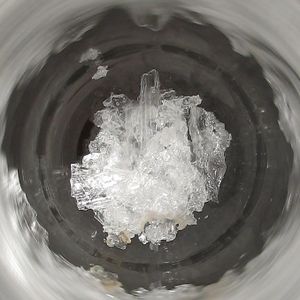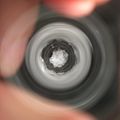Hydrazine perchlorate
 Hydrazine perchlorate crystals close-up
| |
| Names | |
|---|---|
| IUPAC name
Hydrazine perchlorate
| |
| Other names
Hydrazine monoperchlorate
Hydrazine, perchloric acid salt Hydrazinium perchlorate | |
| Properties | |
| H5N2ClO4 | |
| Molar mass | 132.504 g/mol |
| Appearance | White solid |
| Odor | Odorless |
| Density | 1.939 g/cm3[1] |
| Melting point | 140–142 °C (284–288 °F; 413–415 K) |
| Boiling point | Decomposes |
| 23.6 g/100 ml (0 °C) 93.1 g/100 ml (75 °C) | |
| Solubility | Insoluble in benzene, diethyl ether, isopropanol, toluene |
| Solubility in ethanol | 69 g/100 ml (60 °C) |
| Vapor pressure | ~0 mmHg |
| Hazards | |
| Safety data sheet | None |
| Related compounds | |
| Related compounds
|
Hydrazine hydrochloride Hydrazine nitrate |
| Except where otherwise noted, data are given for materials in their standard state (at 25 °C [77 °F], 100 kPa). | |
| Infobox references | |
Hydrazine perchlorate, or more correctly but rarer used hydrazinium perchlorate, is an inorganic compound with the chemical formula N2H5ClO4.
Contents
Properties
Chemical
Hydrazine perchlorate decomposes violently when subjected to strong heat or open flame.[2]
- N2H5ClO4 → N2 + 2 H2O + O2 + HCl
Its decomposition can be accelerated by various compounds, such as copper chromite, potassium dichromate, magnesium oxide, copper salts, etc.
Physical
Hydrazine perchlorate is a colorless solid, soluble in water. It is almost insoluble in ethanol at room temperature, but its solubility increases with temperature and the salt is quite soluble in hot ethanol.
It forms a semihydrate that melts at 64.5 °C.[3]
Explosive
Hydrazine perchlorate is sensitive to strong friction and shock, which will cause detonation.
Availability
Hydrazine perchlorate doesn't appear to be available and has to be made in situ.
Preparation
Hydrazine perchlorate can be made by reacting a cooled 20% solution of freebase hydrazine with an equimolar solution of aq. perchloric acid.[4]
More concentrated reagents can also be used, although this is dangerous as concentrated hydrazine is very toxic.
One recipe shows that hydrazine perchlorate can be prepared by titrating a solution of 85% freebase aq. hydrazine (hydrazine hydrate) to a pH of 3.2 with a solution of 48% perchloric acid. This yielded a stock solution which could be stored indefinitely. Hydrazine perchlorate was precipitated by pouring a volume of this solution into 5 volumes of isopropanol at 0 °C, which causes the salt to precipitate. The hydrazine perchlorate was filtered, washed with cold isopropanol, and vacuum dried at 80 °C. The yield of this process is >99% and the melting point of the resulting product is 142-143 °C.[5]
Projects
- Rocket propellant
- Metal hydrazine perchlorate complexes
Handling
Safety
Hydrazine perchlorate is explosive and toxic. Wear proper protection when handling the compound.
Storage
Don't store it for long, use it as quickly as possible.
Disposal
Dilution in water, followed by destruction with acidified hypochlorite solution.
Gallery
References
- ↑ The Deflagration of Hydrazine Perchlorate, J. B. LEVYG. VON ELBER. FRIEDMANT. WALLINS. J. ADAMS, Advanced Propellant Chemistry, Chapter 7, p. 55-72
- ↑ https://pubs.acs.org/doi/abs/10.1021/ba-1966-0054.ch007
- ↑ Barlot, J., Marsaule, S., Compt. Rend. 228, 1947 (1949)
- ↑ https://woelen.homescience.net/science/chem/exps/hydrazine_perchlorate/index.html
- ↑ The Deflagration of Hydrazine Perchlorate, J. B. LEVYG. VON ELBER. FRIEDMANT. WALLINS. J. ADAMS, Advanced Propellant Chemistry, Chapter 7, p. 55-72
